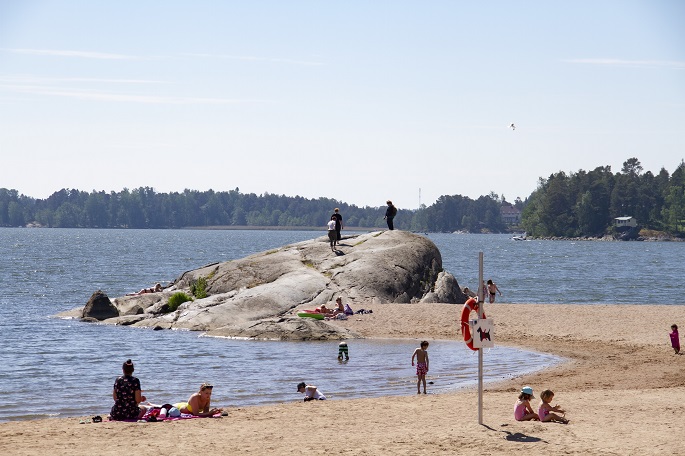Swimming at 4 Helsinki beaches deterred as water quality worsens
Published : 05 Jun 2023, 00:40
The water quality has deteriorated at several Helsinki beaches and four of the beaches were determined to be in poor condition, said the City of Helsinki in a recent press release issued on the eve of the swimming season.
This classification in based on the sample results from four previous swimming seasons.
Swimming at the Iso Kallahti, Marjaniemi and Rastila beaches is not recommended in summer this year.
Furthermore, swimming is not recommended at the beaches located by the Vantaanjoki river during or after periods of heavy rain.
In summer 2022, continuous tryptophan measurement showing changes in the hygienic quality of the water was carried out. Based on the measurements, it was possible to determine that the concentration was caused by a wastewater leak, which most likely flowed to the area through the nearby Mustapuro stream.
In addition, rain washes animal bacteria in the ground into streams and ditches. Helsinki Region Environmental Services HSY carried out extensive surveys in the area, and an incorrect connection between a property’s stormwater and waste water pipe systems was discovered by Mustapuro, east of Ring I.
Additionally, a sewage line by the stream was renovated. Mustapuro has been equipped with a continuous flow meter that can be read remotely and provides information about the water quality, should it deteriorate at the Marjaniemi beach.
The source of the intestinal bacteria found in the water of the Iso Kallahti and Rastila beaches is still unclear, but extensive surveys are being carried out at the beaches. These involve measures such as assessing the water quality of the streams and stormwater lines flowing near the beaches. Additionally, the management of urban water will be enhanced in cooperation with HSY and various organisations of the city.
The Helsinki Environmental Services will perform enhanced water quality monitoring at the Iso Kallahti, Marjaniemi, Pikkukoski and Rastila beaches in summer 2023.
In addition, enhanced water quality monitoring is carried out at the Aurinkolahti beach, whose water quality has been classified as satisfactory.
Water quality of beaches located along Vantaanjoki river may deteriorate during and after heavy rainfall
People are recommended to refrain from swimming at the Pikkukoski, Pakila and Tapaninvainio beaches during and after heavy rainfall in summer 2023.
Results from samples taken in summer 2022 show that the water quality at the beaches deteriorates during heavy rainfall. Heavy rainfall means that it rains at least 4.5 millimetres in a day. Rainfall upstream also affects the water quality of Helsinki beaches. When there is heavy rain, the noticeboards at the beaches are also used to inform visitors of the consequences of heavy rainfall.
The beaches located along Vantaanjoki were also subject to swim restrictions in summers 2021 and 2022.
Helsinki has 25 public beaches. Water samples will be taken regularly at the public beaches to assess the hygienic quality of the water by monitoring the prevalence of faecal bacteria. In addition, water temperatures and blue-algae amounts are also monitored at the beaches.
This year, Helsinki’s lifeguards will supervise the city’s beaches from June 5 to August 13. During this time, the Aurinkolahti and Hietaranta beaches will be supervised by lifeguards daily from 10.00 to 20.00, while Munkkiniemi, Lauttasaari, Pikkukoski, Mustikkamaa, Tuorinniemi, Laajasalo, Marjaniemi, Rastila, Iso Kallahti and Kallahdenniemi will be supervised from 10.00 to 18.00.
Swimming at Plotti, the Pirkkola swimming location with an earthen floor, is supervised daily from 10.00 to 18.00.
The Tobacco Act prohibits smoking at all of the above-mentioned beaches. The City of Helsinki also discourages smoking at all other beaches. The primary purpose of this is to protect small children from the harms of passive smoke exposure.
Additionally, it aims to prevent littering and other environmental harms caused by smoking. The smoking ban is in force on public beaches throughout the summer season, from the beginning of May to the end of September. Designated smoking areas have been established next to the larger beach areas and at the smaller beaches.


